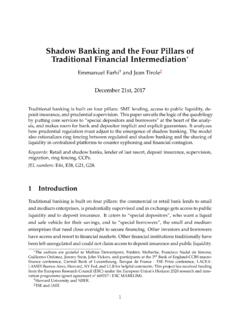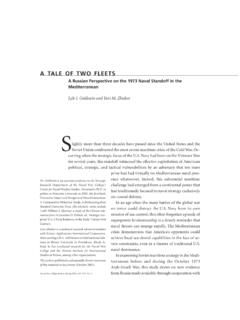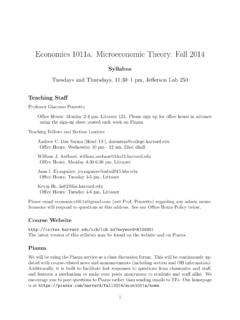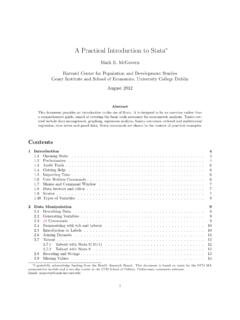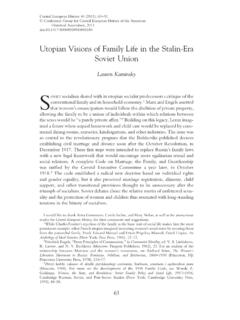Transcription of Stock Market and Investment: Is the Market a Sideshow?
1 RANDALL MORCK. University of Alberta ANDREI SHLEIFER. Harvard University ROBERT W. VISHNY. University of Chicago The Stock Market and Investment: Is the Market a Sideshow? RECENT EVENTS and researchfindingsincreasinglysuggestthat the Stock marketis not drivensolely by news seem to be good theoreticalas well as empiricalreasons to believe that investor sentiment,also referredto as fads andfashions, affects Stock prices. By investor sentimentwe mean beliefs held by some investors that cannot be rationallyjustified. Such investorsare sometimesreferredto as noise traders. To affect prices, these less-than-rationalbeliefs have to be correlated across noise traders, otherwise trades based on mistaken judgments would cancel out. When investor sentiment affects the demandof enough investors, security prices divergefrom fundamental values. The debates over marketefficiency, exciting as they are, would not be importantif the Stock marketdid not affect real economic activity.
2 If the Stock marketwere a sideshow, marketinefficiencieswould merely redistributewealthbetween smartinvestorsandnoise if the Stock marketinfluencesreal economic activity, then the investor senti- mentthat affects Stock prices could also indirectlyaffect real activity. We wouldlike to thankGene Fama, JimPoterba,DavidRomer,MattShapiro,Chris Sims, and Larry Summersfor helpful comments. The National Science Foundation, The Centerfor the Studyof the Economyand the State, the AlfredP. Sloan Foundation, and DimensionalFund Advisors providedfinancialsupport. 157. 158 Brookings Papers on Economic Activity, 2:1990. It is well knownthat Stock returnsby themselves achieve respectable R2 's in forecasting investment changes in aggregate data.' If Stock returnsareinfectedby sentiment,andif stockreturnspredictinvestment, then perhapssentimentinfluencesinvestment. There is also evidence, however, thatinvestmenthas not alwaysrespondedto sharpmovements in Stock prices. Forexample,realinvestmentdidnot seem to rise sharply during the Stock Market boom in the late 1920s.
3 Nor was there an investmentcollapseafterthe crashof remainsan open question, then, whetherinefficientmarketshave real consequences. In this paper, we try to address empiricallythe broaderquestion of how the Stock marketaffects investment. We identifyfour theories that explain the correlationbetween Stock returns and subsequent invest- ment. The firstsays thatthe Stock marketis a passive predictorof future activity that managersdo not rely on to makeinvestmentdecisions. The second theory says that, in makinginvestmentdecisions, managersrely on the Stock marketas a source of information,which may or may not be thirdtheory, whichis perhaps the most common view of the Stock Market 's influence, says that the Stock marketaffects investmentthroughits influenceon the cost of funds and external financing. Finally, the fourth theory says that the Stock marketexerts pressureon investmentquite aside fromits informational andfinancingrole, because managershave to caterto investors'opinions in orderto protect theirlivelihood.
4 For example, a low Stock price may increase the probability of a takeover or a forced removal of top the marketis pessimistic about the firm's profitability, top managementmaybe deterredfrominvestingheavily by the prospect of furthererosion in the Stock price. The first theory leaves no room for investor sentimentto influence investment, but the other three theories allow sentiment to influence investmentthroughfalse signals, financingcosts, or marketpressureon looks for evidence on whether senti- ment affects investment throughthese three channels by investigating whether the component of Stock prices that is orthogonal to future economic fundamentalsinfluencesinvestment. 1. See Bosworth (1975), Fama (1981), Fischer and Merton (1984), Barro (1990), Sensenbrenner(1990),andBlanchard,Rhee, andSummers(1990). 2. Barro(1990);Blanchard,Rhee, andSummers(1990). Randall Morck, Andrei Shleifer, and Robert W. Vishny 159. Our tests measure how well the Stock Market explains investment when we control for the fundamentalvariables both that determine investment and that the Stock Market might be forecasting.
5 These fundamentalvariablesserve as a proxyfor the profitabilityof investment projectsas well as for the availabilityof internalfunds for Essentially,we ask, "Suppose a managerknows the futurefundamental conditions that affect his investment choice. Would the managerstill pay attentionto the Stock Market ?"If the answeris yes, then there is an independentrole for the Stock Market , and possibly for investor senti- ment, in incrementalabilityof Stock returns to explaininvestment,whenfuturefundamentals are held constant,puts an upperbound on the role of investor sentimentthat is orthogonalto fundamentalsin explaininginvestment. For example, suppose that Stock prices forecast investment only to the extent thatthey forecastfundamentalfactorsinfluencinginv estment. In this case, that part of Stock prices-including possible investor sentiment-that does not help predictfundamentalsalso does not help predict investment. Thus, investor sentiment may affect Stock prices independentof future fundamentals,but that influence does not feed throughto investment.
6 If, conversely, the Stock markethelps predict investment beyond its ability to predict future fundamentals, then investor sentiment may independentlyinfluence business investment, through the channels of false signals, financing costs, and Market pressureon managers. Ouranalysisproceeds in several steps. In the firstsection, we review the evidence and theory behindthe idea that investor sentimentaffects Stock prices. In the second section, we describe several views on why the Stock marketmightpredictinvestment,and how investor sentiment mightitself influenceinvestmentthroughthe Stock the third section, we describe the tests that we use to discover how the Stock Market influences investment. The fourth and fifth sections present evidenceusingfirm-leveldatafromthe COMPUSTAT database bearing on the alternativeviews. The next two sections turn to the aggregate datathatmost studiesof investmentexamine. The finalsection presents ourconclusions. 3. MeyerandKuh(1957).
7 160 Brookings Papers on Economic Activity, 2:1990. Investor Sentiment and the Stock Market Since RobertShiller'sdemonstrationof the excess volatilityof Stock Market prices, research on the efficiency of financial markets has subsequentwork, Shillersuggestedthatfads andfashions, as well as fundamentals, influence asset Eugene Fama and KennethFrenchas well as JamesPoterbaandLawrenceSummershave managedto detect mean reversion in Stock this evidence is consistent with the presence of mean-revertinginvestor sentimenttowardstocks, it is also consistent with time-varyingrequired returns. Perhaps more compelling evidence on the role of investor sentimentcomes from the studies of the crash of October 1987. Shiller surveyed investors after the crash and found few who thought that Seyhunfoundthatcorporateinsiders aggressivelyboughtstocks of theirown companiesduringthe crash, and made a lot of money doing The insiders quite correctly saw no change in fundamentalsand attributedthe crash to a sentiment shift.
8 The thrustof the evidence is that Stock prices respondnot only to news, but also to sentimentchanges. Follow-up studies to the work on mean reversion attempt both to prove the influenceof investor sentimenton Stock prices and to isolate measuresof studiesconcernsclosed-endmutual funds-funds that issue a fixed numberof shares, and then invest the proceeds in other traded securities. If investors want to liquidatetheir holdings in a closed-end fund, they must sell their shares to other investors, and cannotjust redeem them as in the case of an open-end fund. Closed-end funds are extremely useful in financial economics because it is possible to observe both their net asset value, which is the marketvalue of their Stock holdings, and their price, and compare the two. A well-knowncharacteristicof closed-endfunds is that their Stock priceis often differentfromtheirnet asset value, suggestingthatmarkets are inefficient. 4. Shiller(1981). 5. Shiller(1984). 6. FamaandFrench(1988);PoterbaandSummers(19 88).
9 7. Shiller(1987). 8. Seyhun(1990). Randall Morck, Andrei Shleifer, and Robert W. Vishny 161. In fact, BradfordDe Long, AndreiShleifer,LawrenceSummers,and Robert Waldmann,following the work of MartinZweig, have argued that the averagediscount on closed-end funds can serve as a proxy for stocks , they sell closed-end funds as well as other stocks . In doing so, they drive up the discounts on closed-end funds (that is, their price relative to those of the stocks in their portfolio) because institutional investors typically do not trade these funds and so do not offset the bearishnessof individualinvestors. Conversely, when individualsare bullish on stocks , they buy closed-end funds so that discounts narrow or even become , Andrei Shleifer, and Richard Thalerpresentevidence suggestingthatdiscountsmightindeed serve as a proxyfor will not reviewthe theory andevidence here, butwilluse closed-endfunddiscountsas one measure of investorsentiment,andwill studytherelationshipsbetweendiscounts, investment,and externalfinancing.
10 The empirical evidence on the potential importance of investor sentimenthas been complementedby a range of theoreticalarguments thatexplainwhy the influenceof sentimenton Stock prices would not be eliminatedthrough"arbitrage."Arbitragein this context does not refer to riskless arbitrage,as understoodin financialeconomics, but ratherto risky, contrarianstrategies whereby smart investors bet against the RobertShillerhave both pointedout that when Stock returnsare risky, arbitrageof this sort is also risky and thereforenot completelyeffective."IFor example, if an arbitrageurbuys underpricedstocks, he runs the risk that fundamentalnews will be bad andthathe will take a bathon whathadinitiallybeen an attractivetrade. Because arbitrageis risky, arbitrageurswill limitthe size of theirtrades, and investor sentiment will have an effect on prices in equilibrium. Othershave takenthis They pointout thatif investor sentimentis itself stochastic, it adds furtherrisk to arbitragebecause sentiment can turn against an arbitrageurwith a short horizon.


